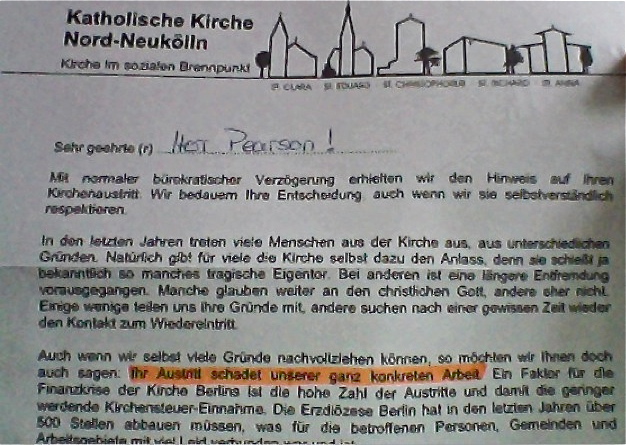Kirchensteuer: A Nasty Letter from the Catholic Church

Recently, I got a nasty letter from the Catholic Church.
But I’ll get to that.
Let me start with the following: one of the shockers of living in Germany, for ex-pats who come from other democracies founded in the Enlightenment tradition, is a lack of separation between Church and State. There are plenty of problems with church/state issues and religious freedom here: not just that State holidays are Christian Church holidays, that there are bans on broadcasting the Call to Prayer, or that German law won’t allow for a traditional Islamic burial (you must be buried in a coffin, not a shroud, and so Muslims send their cadavers abroad). I am talking about something very basic in the way the State operates in favour of Christian religion in Germany: and that’s the money it collects for those religious institutions.
Kirchensteuer or ‘Church Tax’, established under the Weimar constitution (and reiterated under the Grundgesetz of 1949), takes approximately 8-9% of one’s income tax. The German State in this way facilitates the financing of religious institutions and collected almost 10 billion dollars in tax for them last year. Almost the entirety of this amount is split evenly between two Christian faiths: The Protestant Church (Evangelische Kirche) or the Catholic Church. A number of smaller Churches (Old Catholics, Unitarians, some Jewish communities) benefit from relatively minor contributions.
Since the State charges a fee to collect these funds, some communities exempt themselves from being ‘Statutory Corporations’ (Körperschaft des öffentlichen Rechts… such as the Jewish Community of Berlin). Other groups are not allowed to collect Kirchensteuer because their activities are not considered centralised enough: the Muslim community with almost 5 million members is the largest minority community denied this form of official fundraising by the State. The exclusion of Muslims from Church funding is considered by many critics as one of the greatest indications from the State that it considers itself a primarily Christian country where Islam as foreign.

When I first came to Germany, I had to register my address (the Anmeldung) in a neighbourhood office. I was asked at this first interview whether I was religious. I replied: I am not. But the official at Kreuzberg’s Bezirksamt was not going to let me go so easily. She asked: but, surely, you’ve been baptised? This is how, at that time, in a flurry of German bureaucracy, and without the necessary technical language or local savvy to understand the German tax code, I was entered as ‘Roman Catholic’ on my file. I filed taxes every year without ever thinking I might be registered as belonging to a religious community, until the tax man came knocking on my door demanding 8% of my income tax for all those years for the Roman Catholic Church in Germany. I did not want to pay it but in the end I had to.
The way out is the Austritt: or an official declaration that you have left the Church. I showed up at the Amtsgericht in my community, sat in a grey office, filled out a form, they took a copy, I took a copy to my tax lawyer. I wouldn’t get my (unintentional) subvention to the Church back, but at least I wouldn’t be obliged to chip in for the holy wine in future. It was a liberating act, even if I’d made my break from the institution years before.
About a week later, I get a nasty letter in the post from the Church. They weren’t too happy and wrote a rhetorically very careful epistle meant to hook into all that Catholic guilt education you’d grown up with: ‘we respect you… but… you are damaging our concrete work’. I will not digress about how I feel about the concrete work of the Church (the sex-abuse scandals, its position on homosexuality, on contraceptives in HIV-plagued Africa…let alone all the ‘man in the sky’ malarkey) or about how the contributions I make to secular charitable organisations are more meaningful to me. Meanwhile, apparently the Catholic Bishops have decided that if you don’t pay Church Tax, you are de-facto excommunicated. I already expected not to benefit from Catholic social services when I’m old, but now no more confession (schade) and the refusal of a church burial. I never thought being Catholic should be about paying tax to an earthly authority, but I guess I was wrong.
Now that there are German federal elections this weekend, take a look at the posters around town from the Pirate Party stating “Privatise Religion Now!”. I can’t be the only one who has lost faith in the way the State implicates us in affairs which should not be those of the State.

I was shocked to learn from my boyfriend that Germany allows (without consent!) direct patrol deductions to a religious organization – let alone an organization as corrupt and criminal as the Catholic Church!
Good on you for fighting back. I am immigrating to Germany this year and will have to register soon at my local office – thanks for the tip to ensure that I completely say that I am an atheist and to ensure I am not put on the churches’ books!
I had a similar experience at the Amt when I first arrived, being a bit green I was signed up as Prodestant. I only realised to my horror when I received an invite from my local church to join them for the Easter services they offered that I’d been signed up. Like the original post above, a mornings work visiting the Amt , Law Court and then the Tax Office finally released me.
When I first came to Germany and was asked for my religious affiliation for my residency permit, I was shocked, offended and pretty much said it was none of their damned business. When they told me it was necessary for tax purposes, I don’t think I really comprehended (who’d have thought there was such a thing as Kirchensteuer!), and told them I’m Christian – which I am. But I can certainly say, as an atheist Catholic Christian who’s pretty well aware of the situation of religion in Germany, that the whole system in which the church(es) and state are so intertwined in this country is entirely fucked up. In addition to explicit religious discrimination at public institutions, which also equates with a restriction on freedom of expression, I consider the problem of Kirchensteuer horrendous. They are not incorrect to recognize baptism as the rite of initiation through which one becomes Christian (self-identification is okay for adults, but, e.g., small children are indeed also Jewish, Hindu, Christian, Muslim, etc.). The problem is the forced collection of funds on this basis – even if it is given to the corresponding religious body. As Joseph points out, this amounts to paying a monetary fee in order to belong to your religion. At least within my religious tradition (Christianity), this is abhorrent! It also places the German government in the absurd position of dictating whether or not you are an adherent of your own religious tradition, and this – again absurdly – on the basis of whether you’ve paid up. Luckily, I haven’t had to pay any taxes in Germany (Kirchensteuer or otherwise). It is, however, high time the Germans move from the 17th or 18th century into the 20th century (yeah, you read that right). If, as a private citizen, I want to make a monetary gift to any religious organization of any sort, fine. But to channel this through the government – even if they received none of the money – and to *require* this of people in order for them to be legally considered part of their own religion should be considered an affront by the synagogues, temples, churches and mosques themselves. To be sure, this is part of a much bigger problem (including confessional religious instruction at state schools and universities), but it’s one with which the Germans are going to have to wrestle.
Since you haven’t reprinted the entire letter, I might be missing something – but from what I can see, the letter doesn’t look particularly nasty to me (certainly a touch of the Catholic guilt though).
Just my two cents: I’m more than happy to pay my Catholic Kirchensteuer, and dutifully sign up on moving to Berlin a couple of years ago… only to find that my forms had been bungled and I’d been paying my contribution to the Protestants the whole time! My guess is that they assumed I didn’t understand the forms, and arbitrarily assigned my denomination based on nationality. My fault for signing up for Church tax, you could say.
Anyway, the worst part of it was when I phoned up to correct this/complaint – the official responsible told me (quoting almost directly) that “it would be very difficult to change retrospectively, can’t we just leave it?”
Long story short, whatever your stance on the Church, the Kirchensteuer is a bureaucratic, money-making racket.
It gets worse. The unholy inquisition is on a crusade to recapture those who turned their backs on the Piet Cong. Or at least make them pay for their sins.
Having officially signed out of the church approx. 35 years ago in front of a German district court, I moved to Berlin not that long ago. Only to receive a letter from a strange entitity repesenting both the taxman and the pope, wherein it was claimed that while I had alleged non-membership of their clubs, they had no record of that, and asking me to produce feasible proof of the matter or else I would have to pay church tax from now on, and in fact for six years in the past.
I have lived in another German state for long stretches of my life, and noone ever asked me that, and naturally I don’t hold any documents of my resignation. Nobody cared for 35 years. The holy cohorts of Berlin-Brandenburg do, and they’re no joke.
It is even nastier for my wife, born in Poland, where you stay in the claws of the Roman Catholic for life, with no exit option. It is only a very recent phenomenon that you can actually opt put of the church: you’ll have to come on your knees, bring two witnesses of solid and proven catholic faith, and beg them to let you out.This is 21st century Poland for you. Needless to say, my wife never went for this option and never will. Our children have not been baptised. But from what it looks like now, we will end up in front of a German court, and will have to pay (literally) THOUSANDS of euros in compensation for our mortal sins. And it is all in accordance with the law and is happening to others right this moment.
What makes it even better is that we were both victims of abuse in church institutions. Hallelujah. Maybe it’s time for an animal sacrifice on their doorstep.
This goes back to the 1870s. Catholics were the victim of a “culture war” along with other religions. Many had to move out of the country. What you’re seeing now is likely an over reaction to make up for it. No one wants to go down the Bismark and Hitler road again.
Go by the expectations of the church in your native land. If your homeland doesn’t charge 8% don’t pay it in Germany. You’re still considered good back home by the same church.